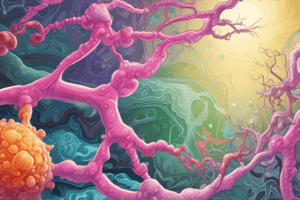Podcast
Questions and Answers
What is the term used to describe the uncontrolled growth of cells that results in a mass of tissue?
What is the term used to describe the uncontrolled growth of cells that results in a mass of tissue?
- Tumor (correct)
- Sarcoma
- Leukemia
- Carcinoma
Which type of cancer develops in the tissues that support and connect the body?
Which type of cancer develops in the tissues that support and connect the body?
- Lymphoma
- Leukemia
- Carcinoma
- Sarcoma (correct)
What is the term used to describe cancer that originates in the skin or tissue that covers the surface of internal organs and glands?
What is the term used to describe cancer that originates in the skin or tissue that covers the surface of internal organs and glands?
- Leukemia
- Lymphoma
- Sarcoma
- Carcinoma (correct)
What is the term used to describe a non-cancerous growth that will not spread to other tissues and organs?
What is the term used to describe a non-cancerous growth that will not spread to other tissues and organs?
Which type of cancer involves the blood-forming tissues, including the bone marrow and the lymphatic system?
Which type of cancer involves the blood-forming tissues, including the bone marrow and the lymphatic system?
What is the term used to describe a cancerous growth that can spread to other tissues and organs?
What is the term used to describe a cancerous growth that can spread to other tissues and organs?
What is the primary reason why age is a risk factor for cancer?
What is the primary reason why age is a risk factor for cancer?
Which of the following types of cancer is most likely to be caused by the Epstein-Barr virus?
Which of the following types of cancer is most likely to be caused by the Epstein-Barr virus?
What is the primary way that tobacco use increases the risk of cancer?
What is the primary way that tobacco use increases the risk of cancer?
What is the primary way that a family history of cancer increases an individual's risk of developing the disease?
What is the primary way that a family history of cancer increases an individual's risk of developing the disease?
What is the primary way that radiation exposure increases the risk of cancer?
What is the primary way that radiation exposure increases the risk of cancer?
Flashcards
Tumor
Tumor
An uncontrolled growth of cells forming a mass.
Sarcoma
Sarcoma
Cancer that develops in supportive and connective tissues.
Carcinoma
Carcinoma
Cancer originating in skin or internal organ surfaces.
Benign
Benign
Signup and view all the flashcards
Leukemia
Leukemia
Signup and view all the flashcards
Malignant
Malignant
Signup and view all the flashcards
Age as a risk factor
Age as a risk factor
Signup and view all the flashcards
Epstein-Barr virus and lymphoma
Epstein-Barr virus and lymphoma
Signup and view all the flashcards
Tobacco use and cancer
Tobacco use and cancer
Signup and view all the flashcards
Family history and cancer
Family history and cancer
Signup and view all the flashcards
Radiation exposure and cancer
Radiation exposure and cancer
Signup and view all the flashcards
Study Notes
Cancer Overview
- Cancer is a disease process that begins when an abnormal cell is transformed by genetic mutation of cellular DNA
- A cell becomes cancerous when it expands rapidly and uncontrollably
Cancer Risk Factors
- Age: accumulation of genetic mutations
- Prolonged exposure to carcinogens
- Decline in immune function
- Genetics: family history of similar cancer type
- Behavior/Lifestyle: tobacco use, UV radiation exposure, poor lifestyle choices
- Viruses/Bacteria: certain viruses/bacteria can trigger cancer (e.g., HPV, Hepatitis B/C, Epstein-Barr virus)
Types of Cancer
Carcinoma
- Originates in skin tissue covering internal organs and glands
- Can form solid tumors
- Examples: prostate cancer, breast cancer, lung cancer, colorectal cancer
Sarcoma
- Starts in tissues that support and connect the body (fat, muscles, nerves, tendons, joints, blood vessels, lymph vessels, cartilage, bone)
- Examples: gastrointestinal stromal tumors, osteosarcoma
Leukemia
- Cancer of the body's blood-forming tissues (bone marrow and lymphatic system)
- Examples: Lymphocytic leukemia, myelogenous leukemia
Lymphoma
- Cancer of the lymphatic system (lymph nodes, spleen, thymus gland, bone marrow)
- Examples: Hodgkin's lymphoma, Non-Hodgkin's lymphoma, Myeloma (bone marrow cancer)
- Subtypes: solitary plasmacytoma, extramedullary plasmacytoma
Studying That Suits You
Use AI to generate personalized quizzes and flashcards to suit your learning preferences.




